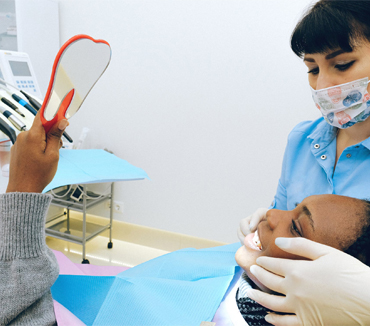Temporomandibular joint dysfunction (TMJ) treatment disorders - Diagnosis and treatment
It’s a good thing we can open and close our mouths so that we can do the things that we enjoy like eating and speaking - we have our temporomandibular joints (TMJ) to thank for that! The TMJ is made up of muscles, ligaments, and the jawbones that help control jaw movement. The TMJ also contains a disc that helps absorb oral forces and allows the jaw to move. Like other joints in the body, the TMJ can experience issues that result in symptoms like pain and discomfort.
What are signs and symptoms of TMJ?

- Pain in the head and neck area
- A clicking sound upon opening or closing the mouth
- Jaw dislocation or locked jaw
- Jaw muscles tenderness
- Facial swelling
- Trouble chewing
It is important to inform your dentist if you are experiencing any of these signs and symptoms for proper diagnosis and treatment.
What are the causes of TMJ?
The exact cause of TMJ disorders can be tricky, as they can be a result of multiple factors. Research has determined genetics, arthritis, jaw injury, tooth and jaw misalignment, certain diseases, anxiety, stress, and teeth grinding as some potential causes of TMJ disorders. Visit your dentist for a thorough evaluation of your teeth, jaw joints, and muscles.
How to prevent TMJ ?
In less severe cases, TMJ issues may be solved by non-surgical lifestyle practices. This may include:
- Maintaining the resting position of your jaw
- Improving your posture
- Having adequate hours of sleep
- Applying a hot or cold compress to relax jaw muscles
- Reducing stress
- Jaw exercises
- Avoiding negative oral habits such as tooth grinding and clenching, chewing on pencils, and nail biting
- Avoid overuse of jaw muscles (ex. Chewing gum, hard foods)
When should you seek treatment?
It is important to see your dentist immediately if experiencing persistent jaw pain, trouble chewing, or any other painful symptoms relating to your jaws. Depending on the severity, your dentist may refer you to a TMJ specialist for further evaluation.
Treatment available for TMJ
Depending on the cause, there are many treatment options for managing TMJ disorders. Your dentist may recommend relaxation jaw exercises, orthodontic treatment, medications such as muscle relaxants or anti-inflammatory drugs, or a night guard to decrease clenching or grinding of teeth. In more severe cases, jaw surgery or bite splints may be recommended to help manage TMJ disorders.
CTA
Computed tomographic angiography (CTA) is a tool used to help evaluate the TMJ and involves a CT scan and a dye material to generate images for evaluation. According to a study by Susarla and colleagues, CTA may be valuable in some cases in the treatment of individuals with TMJ ankylosis, in which the joint fuses to the bone and no longer functions properly.
Our doctors and dental specialists provide a wide range of dental services at our 40+ multi-specialty dental offices across Massachusetts and New Hampshire. Our dental team is compassionate, and our main goal is to provide you a comfortable, caring dental experience. Book an appointment at your local Gentle Dental today.



